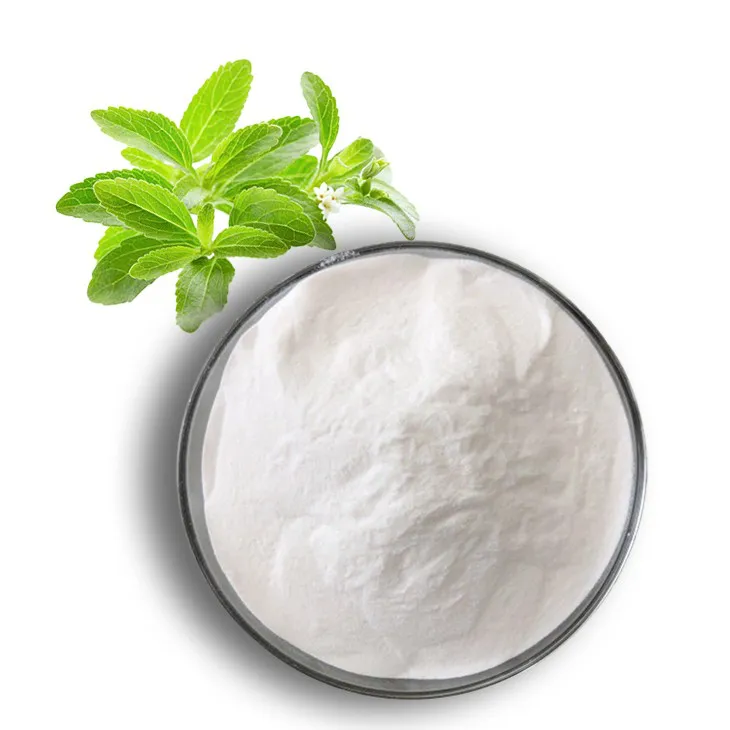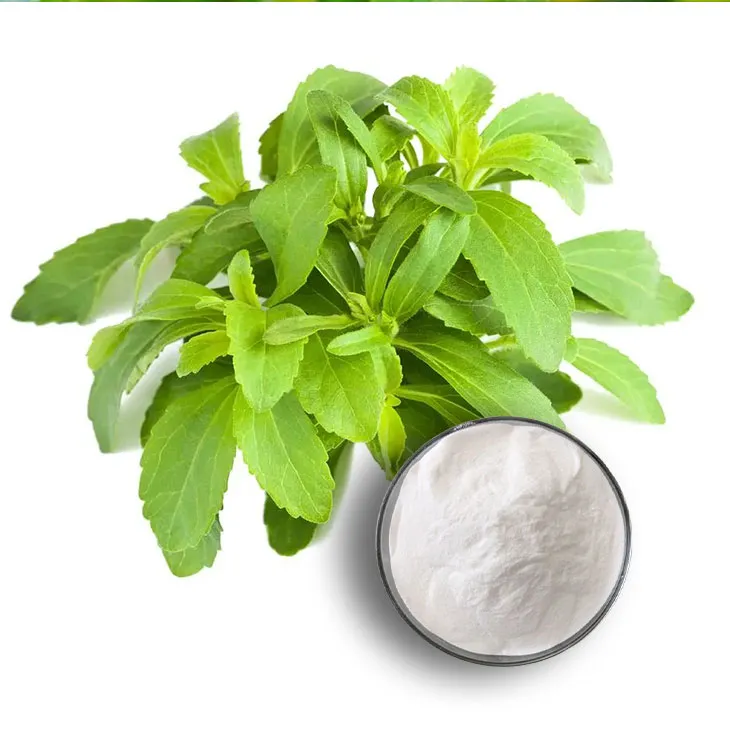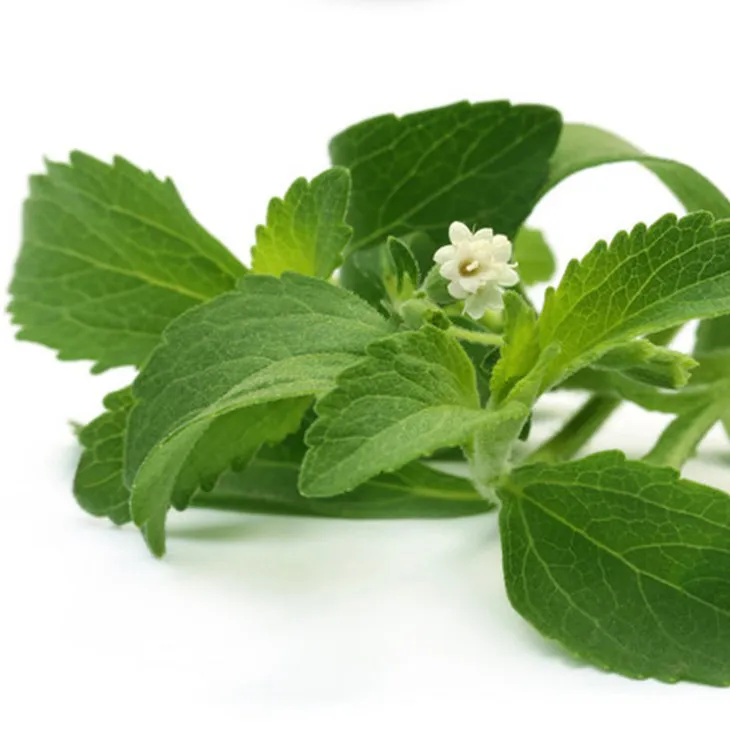- 0086-571-85302990
- sales@greenskybio.com
Seven Trends of Stevia Extracts.
2024-12-17

1. Growing Consumer Awareness
Stevia Extract has been gaining significant attention in recent years, primarily due to its low - calorie and natural properties. Consumers are becoming more health - conscious and are actively seeking alternatives to traditional sweeteners that are high in calories. Stevia, a plant - based sweetener, offers a zero - calorie or very low - calorie option, which is highly appealing.
With the increasing prevalence of obesity and related health issues such as diabetes, consumers are looking for ways to reduce their calorie intake without sacrificing the sweetness in their food and beverages. Stevia Extract provides a natural solution, as it is derived from the Stevia rebaudiana plant. This natural origin gives consumers the perception of a healthier choice compared to artificial sweeteners.
Moreover, the food and beverage industry has been quick to respond to this growing consumer demand. Many products are now labeled as "stevia - sweetened" or "contains Stevia Extract," which further increases consumer awareness. Marketing campaigns highlighting the benefits of stevia, such as its suitability for diabetics and those on a weight - loss journey, have also contributed to its popularity.

2. Innovation in Product Formulation
The use of stevia extract in product formulation has seen remarkable innovation. Manufacturers are constantly exploring ways to overcome some of the initial challenges associated with stevia, such as its aftertaste.
Blending with other sweeteners: One trend is the blending of stevia extract with other sweeteners. For example, combining stevia with erythritol or monk fruit extract can help to mask the aftertaste and create a more well - rounded sweet flavor profile. This blend also allows for a reduction in the overall amount of sweetener needed while maintaining the desired level of sweetness.
Micro - encapsulation technology: Another innovative approach is the use of micro - encapsulation technology. This involves enclosing stevia extract in tiny capsules, which can help to control the release of the sweet taste. It can also protect the stevia extract from degradation during processing and storage, ensuring a more stable and consistent sweetening effect.
Formulation for different product categories: Stevia extract is being formulated specifically for different product categories. In the beverage industry, it is being used to create low - calorie sodas, energy drinks, and flavored waters. In the confectionery sector, it is being incorporated into chocolates, candies, and chewing gums. The ability to adapt stevia - based formulations to different product textures and flavors is a key trend in product development.

3. Influence on the Agricultural Economy
The production of stevia has a significant impact on the agricultural economy.
Crop cultivation: Stevia rebaudiana is a relatively new crop in many regions. The expansion of stevia cultivation has provided new opportunities for farmers. In some areas, farmers are switching from traditional crops to stevia due to its potentially higher profitability. The crop is well - suited to certain climates and soil conditions, and with proper agricultural practices, it can be a sustainable and lucrative crop.
Job creation: The growth of the stevia industry has led to job creation not only in farming but also in related sectors such as processing and distribution. There is a need for workers to cultivate, harvest, and process the stevia leaves into extract. Additionally, jobs are created in the transportation and marketing of stevia - related products.
Economic diversification: For regions that have a predominantly monoculture agricultural system, stevia cultivation can offer economic diversification. It can reduce the dependence on a single crop and provide a more stable agricultural economy. For example, in some developing countries, stevia cultivation is being promoted as a means to boost rural economies and improve the livelihoods of farmers.

4. Emerging Trends in International Trade
Stevia - related products are becoming increasingly important in international trade.
Increasing exports: Many countries are now exporting stevia extract and stevia - based products. Countries with favorable climates for stevia cultivation, such as Paraguay and Kenya, are emerging as major exporters. The demand for stevia in developed countries, where there is a large market for low - calorie and natural sweeteners, is driving these exports.
Quality standards and regulations: With the growth of international trade in stevia, there is an increasing focus on quality standards and regulations. Different countries have different requirements regarding the purity, safety, and labeling of stevia products. This has led to the need for producers to adhere to international standards, such as those set by Codex Alimentarius. Meeting these standards is crucial for accessing international markets.
Tariff and trade policies: Tariff and trade policies also play a role in the international trade of stevia. Some countries may impose tariffs on stevia imports to protect their domestic sweetener industries. However, free - trade agreements can also facilitate the trade of stevia products. For example, under certain trade agreements, tariffs on stevia extract may be reduced or eliminated, promoting its trade between participating countries.

5. Research and Development in Stevia Extraction Technology
There is a continuous trend of research and development in stevia extraction technology.
Improving extraction efficiency: Scientists are constantly looking for ways to improve the extraction efficiency of stevia extract. This involves developing new extraction methods that can yield a higher quantity and quality of extract from the stevia leaves. For example, some research is focused on using supercritical fluid extraction, which can produce a purer and more concentrated stevia extract compared to traditional extraction methods.
Enhancing the purity of extract: Another aspect of R & D is enhancing the purity of the stevia extract. By removing impurities and unwanted compounds, the taste and quality of the extract can be improved. This is important for applications in high - end food and beverage products where a pure and clean - tasting sweetener is required.
Reducing production costs: Research is also aimed at reducing the production costs associated with stevia extract. This can be achieved through optimizing the extraction process, reducing energy consumption, and finding more cost - effective raw materials. Lower production costs can make stevia extract more competitive in the market, especially against other sweeteners.
6. Expansion in the Dietary Supplement Market
Stevia extract is finding an expanding role in the dietary supplement market.
Appeal to health - conscious consumers: Dietary supplements are often targeted at health - conscious consumers. Stevia's natural and low - calorie properties make it an attractive ingredient in supplements. It can be used as a sweetener in multivitamins, protein powders, and other dietary supplements without adding significant calories.
Potential health benefits: There is also some research suggesting potential health benefits associated with stevia. Some studies have indicated that stevia may have antioxidant and anti - hyperglycemic properties. These potential health benefits further enhance its appeal in the dietary supplement market.
Product diversification: In the dietary supplement market, stevia - based products are diversifying. There are now stevia - sweetened pre - workout supplements, post - workout recovery supplements, and even stevia - based herbal supplements. This diversification is driven by the growing demand for stevia in the supplement industry and the need to offer unique products to consumers.
7. Sustainability and Environmental Considerations
Sustainability and environmental considerations are emerging as important trends in the stevia industry.
Sustainable cultivation practices: Stevia rebaudiana can be cultivated using sustainable agricultural practices. For example, it can be grown organically, reducing the use of pesticides and fertilizers. Some farmers are also implementing water - saving irrigation techniques, as stevia is relatively drought - tolerant. Sustainable cultivation not only benefits the environment but also meets the growing consumer demand for sustainable products.
Reduction of carbon footprint: Compared to some other sweeteners, stevia has the potential to have a lower carbon footprint. The production of stevia extract requires less energy - intensive processing compared to artificial sweeteners. Additionally, the plant - based nature of stevia means that it can be a more sustainable option in terms of resource use.
Biodegradability: Stevia extract is biodegradable, which is an advantage in terms of environmental impact. When stevia - sweetened products are disposed of, the stevia extract does not pose the same environmental risks as some non - biodegradable sweeteners. This aspect is becoming increasingly important as consumers and industries become more environmentally conscious.
FAQ:
What are the main reasons for the growing consumer awareness of stevia extract?
The main reasons for the growing consumer awareness of stevia extract are its low - calorie and natural properties. Consumers are increasingly health - conscious and are looking for alternatives to high - calorie sweeteners. Stevia extract, being a natural sweetener with few calories, fits this demand well.
How is stevia extract being innovatively used in product formulation?
Stevia extract is being innovatively used in product formulation in various ways. For example, it is being combined with other ingredients to improve taste and texture. In the food and beverage industry, it is used to create new low - calorie or sugar - free products. It is also being used in the development of dietary supplements and pharmaceuticals.
What is the influence of stevia extract on the agricultural economy?
The influence of stevia extract on the agricultural economy is significant. The cultivation of stevia plants provides income for farmers. As the demand for stevia extract increases, more land may be dedicated to stevia cultivation. This can lead to changes in agricultural practices, employment opportunities in rural areas, and potentially impact on local economies through trade and value - addition activities related to stevia production.
What are the emerging trends in the international trade of stevia - related products?
The emerging trends in the international trade of stevia - related products include an increase in exports from major producing countries. There is also a growing demand in international markets, especially in countries where there is a high prevalence of diabetes and obesity and a strong demand for natural, low - calorie sweeteners. Additionally, regulatory changes in different countries can impact trade, with some countries promoting the use of stevia extract through favorable import policies.
Can stevia extract completely replace traditional sweeteners?
While stevia extract has many advantages, it may not completely replace traditional sweeteners. Taste is a major factor, as some people may still prefer the taste of traditional sweeteners like sucrose. Also, in some applications, traditional sweeteners may have better functionality in terms of baking or preservation. However, in the growing market for low - calorie and natural sweeteners, stevia extract is becoming an increasingly important alternative.
Related literature
- The Stevia Revolution: A Comprehensive Review of Stevia Extract and its Applications"
- "Stevia Extract: Trends in Production, Consumption and Trade"
- "Innovation in Stevia - Based Product Development"
- ▶ Hesperidin
- ▶ citrus bioflavonoids
- ▶ plant extract
- ▶ lycopene
- ▶ Diosmin
- ▶ Grape seed extract
- ▶ Sea buckthorn Juice Powder
- ▶ Beetroot powder
- ▶ Hops Extract
- ▶ Artichoke Extract
- ▶ Reishi mushroom extract
- ▶ Astaxanthin
- ▶ Green Tea Extract
- ▶ Curcumin Extract
- ▶ Horse Chestnut Extract
- ▶ Other Problems
- ▶ Boswellia Serrata Extract
- ▶ Resveratrol Extract
- ▶ Marigold Extract
- ▶ Grape Leaf Extract
- ▶ blog3
- ▶ blog4
- ▶ blog5
-
Pure 85% Tomentil Extract.
2024-12-17
-
Dan Shen Root Extract/Salvia Root Extract
2024-12-17
-
Giant Knotweed Extract
2024-12-17
-
Shikonin
2024-12-17
-
Sophora Flavescens Root Extract
2024-12-17
-
Camu Camu Extract
2024-12-17
-
Grapefruit Seed Extract Powder
2024-12-17
-
Motherwort Extract
2024-12-17
-
Chasteberry Extract
2024-12-17
-
Acerola Juice Powder
2024-12-17
-
Longan Extract
2024-12-17





















